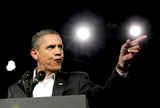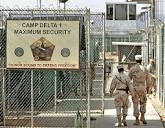By DAVID E. SANGEROCT. 19, 2014
WASHINGTON — No one knows if the Obama administration will manage in the next five weeks to strike what many in the White House consider the most important foreign policy deal of his presidency: an accord with Iran that would forestall its ability to make a nuclear weapon. But the White House has made one significant decision: If agreement is reached, President Obama will do everything in his power to avoid letting Congress vote on it.
Even while negotiators argue over the number of centrifuges Iran would be allowed to spin and where inspectors could roam, the Iranians have signaled that they would accept, at least temporarily, a “suspension” of the stringent sanctions that have drastically cut their oil revenues and terminated their banking relationships with the West, according to American and Iranian officials. The Treasury Department, in a detailed study it declined to make public, has concluded Mr. Obama has the authority to suspend the vast majority of those sanctions without seeking a vote by Congress, officials say.
But Mr. Obama cannot permanently terminate those sanctions. Only Congress can take that step. And even if Democrats held on to the Senate next month, Mr. Obama’s advisers have concluded they would probably lose such a vote.
“We wouldn’t seek congressional legislation in any comprehensive agreement for years,” one senior official said.
White House officials say Congress should not be surprised by this plan. They point to testimony earlier this year when top negotiators argued that the best way to assure that Iran complies with its obligations is a step-by-step suspension of sanctions — with the implicit understanding that the president could turn them back on as fast as he turned them off.
“We have been clear that initially there would be suspension of any of the U.S. and international sanctions regime, and that the lifting of sanctions will only come when the I.A.E.A. verifies that Iran has met serious and substantive benchmarks,” Bernadette Meehan, the spokeswoman for the National Security Council, said Friday, referring to the International Atomic Energy Agency. “We must be confident that Iran’s compliance is real and sustainable over a period of time.”
But many members of Congress see the plan as an effort by the administration to freeze them out, a view shared by some Israeli officials who see a congressional vote as the best way to constrain the kind of deal that Mr. Obama might strike.
Ms. Meehan says there “is a role for Congress in our Iran policy,” but members of Congress want a role larger than consultation and advice. An agreement between Iran and the countries it is negotiating with — the United States, Britain, France, Germany, Russia and China — would not be a formal treaty, and thus would not require a two-thirds vote of the Senate.
The chairman of the Senate Foreign Relations Committee, Senator Robert Menendez, the New Jersey Democrat, said over the weekend that, “If a potential deal does not substantially and effectively dismantle Iran’s illicit nuclear weapons program, I expect Congress will respond. An agreement cannot allow Iran to be a threshold nuclear state.” He has sponsored legislation to tighten sanctions if no agreement is reached by Nov. 24.
A leading Republican critic of the negotiations, Senator Mark S. Kirk of Illinois, added, “Congress will not permit the president to unilaterally unravel Iran sanctions that passed the Senate in a 99 to 0 vote,” a reference to the vote in 2010 that imposed what have become the toughest set of sanctions.
Such declarations have the Obama administration concerned. And they are a reminder that for a deal to be struck with Iran, Mr. Obama must navigate not one negotiation, but three.
The first is between Mr. Obama’s negotiators and the team led by Mohammad Javad Zarif, the savvy Iranian foreign minister. The second is between Mr. Zarif and forces in Tehran that see no advantage in striking a deal, led by many in the Iranian Revolutionary Guard Corps and many of the mullahs. The critical player in that effort is Ayatollah Ali Khamenei, who has reissued specific benchmarks for an accord, including Iran’s eventual expansion of its uranium enrichment program by nearly tenfold. And the third is between Mr. Obama and Congress.
Mr. Zarif, in an interview last summer, said that Mr. Obama “has a harder job” convincing Congress than he will have selling a deal in Tehran. That may be bluster, but it may not be entirely wrong.
Many of the details of the negotiations remain cloaked. The lead negotiator, Wendy Sherman, the under secretary of state for political affairs and a leading candidate to become the State Department’s No. 2 official next month, struck a deal with congressional leaders that enables her to avoid public testimony when the negotiations are underway. Instead, she conducts classified briefings for the key congressional committees.
But it is clear that along with the fate of Iran’s biggest nuclear sites — Natanz and Fordow, where uranium fuel is enriched, and a heavy-water reactor at Arak that many fear will be able to produce weapons-grade plutonium — the negotiations have focused intently on how sanctions would be suspended. To the Americans, the sanctions are their greatest leverage. For many ordinary Iranians, they are what this negotiation is all about: a chance to boost the economy, reconnect with the world and end Iran’s status as a pariah state.
For that reason, many think Mr. Obama’s best option is to keep the negotiations going if a deal is not reached by the deadline, a possibility both Iranian and Russian officials have floated.
“Between now and 2017 Obama’s goal is to avert an Iranian bomb and avert bombing Iran,” said Karim Sadjadpour of the Carnegie Endowment for International Peace. “If Congress feels obliged to pass additional sanctions, the best way to do it would be to create a deterrent — basically to say if you recommence activities Iran has halted, here are new sanctions.”
But Mr. Obama is feeling pressure as well. Some cracks are appearing in the sanctions regime. In the spring, the administration was alarmed to see a spike in Chinese purchases of Iranian oil, seeming to undercut the sanctions. More recently the figures have declined again. Nonetheless they are the subject of behind-the-scenes talks between American and Chinese officials. And the Iranians want far more than a suspension of American-led sanctions: They are also pressing for an end to United Nations Security Council resolutions that bar “dual use” exports that have civilian uses but also could be used in nuclear and missile programs; those resolutions give the United States and its allies a legal basis for demanding inspections of shipments to Iran that could be part of a covert program.
Inside America’s intelligence agencies, the biggest concern is that Iran, concluding that its existing facilities are under too much scrutiny, would once again turn to covert means to obtain nuclear technology — buying it from the North Koreans, or building it in one of hundreds of tunnels.
“We have not seen much lately,” a senior intelligence official said. “But over the past 10 years, we’ve uncovered three covert programs in Iran, and there’s no reason to think there’s not a fourth out there.”







